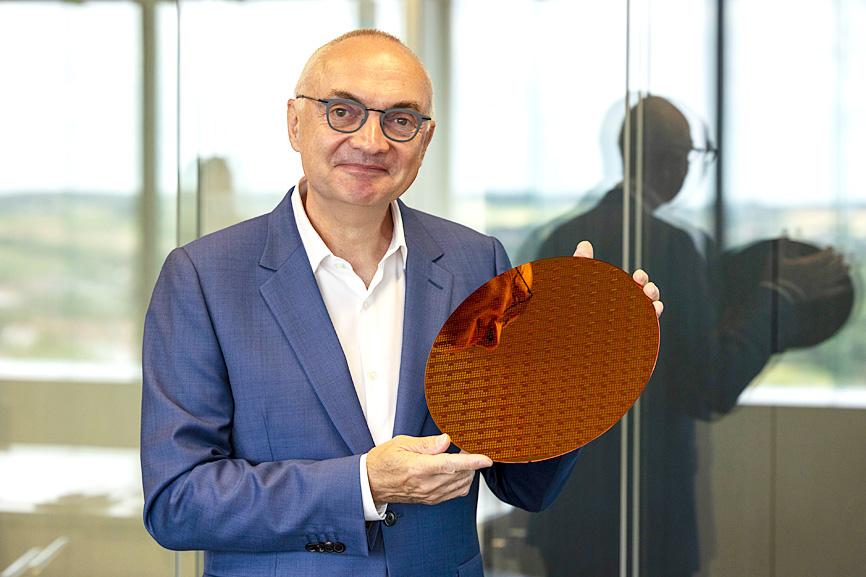Focusing on bilateral cooperation in the semiconductor industry, the Taiwan-Belgium Joint Business Council meeting, the most important annual business event between the countries, is to take place on Thursday next week, the Belgian Office Taipei said.
Due to COVID-19, the meeting for a second consecutive year is to be a hybrid Webinar, with Taiwanese business representatives gathered in Taipei and their Belgian counterparts joining online, the Belgian office said.
The semiconductor industry is to be the primary focus, given that Taiwan is a leader in the field amid a global chip shortage, the office said.

Photo: Bloomberg
The EU in February unveiled the European Chips Act, which eases rules restricting the use of state aid to attract companies such as Intel Corp and Taiwan Semiconductor Manufacturing Co (台積電) to manufacture more chips in the region.
Belgium is home to the world’s leading semiconductor research and development institution, the Interuniversity Microelectronics Centre (IMEC), the office said.
The act encourages Belgium — home to the EU capital, Brussels — to showcase its advantages in the semiconductor market and to attract Taiwanese companies to invest in European projects, it said.
The highlight of the meeting is to be an address by IMEC chief strategy officer Jo de Boeck on “full-stack” innovation trends in the global semiconductor industry, the office said.
The annual meeting, first held in 1981, typically alternates between Belgium and Taiwan, but has taken place in a hybrid format since the emergence of COVID-19.
Belgium is Taiwan’s fifth-largest trading partner among EU member states, after Germany, the Netherlands, Italy and France, government data showed.
In 2020, trade between the two nations totaled US$2.19 billion.
Meanwhile, a delegation led by Minister Without Portfolio John Deng (鄧振中) is to attend the SelectUSA Investment Summit in June, an Executive Yuan official said on Tuesday on condition of anonymity.
The summit is an annual US Department of Commerce event that focuses on facilitating investment that creates US jobs, and is to take place this year in Maryland from June 26 to 29.
Several Taiwan-based firms, especially those in the semiconductor and 5G sectors, are expected to attend, alongside US business representatives, along with federal and state officials.
The semiconductor and 5G sectors were highlighted at the Economic Prosperity Partnership Dialogue that was held virtually in November last year.
The Executive Yuan official said that although the list of Taiwanese participants has yet to be finalized, the American Institute in Taiwan, the US’ de facto embassy, had sent invitations to several prominent government officials, including National Development Council Minister Kung Ming-hsin (龔明鑫).
The Biotechnology and Pharmaceutical Industries Promotion Office said that SelectUSA has since its inception attracted US$59 billion in direct investment to the US and created 49,000 jobs there.
Last year, 28 US state governors and eight federal government officials took part in the summit.

In Italy’s storied gold-making hubs, jewelers are reworking their designs to trim gold content as they race to blunt the effect of record prices and appeal to shoppers watching their budgets. Gold prices hit a record high on Thursday, surging near US$5,600 an ounce, more than double a year ago as geopolitical concerns and jitters over trade pushed investors toward the safe-haven asset. The rally is putting undue pressure on small artisans as they face mounting demands from customers, including international brands, to produce cheaper items, from signature pieces to wedding rings, according to interviews with four independent jewelers in Italy’s main

Macronix International Co (旺宏), the world’s biggest NOR flash memory supplier, yesterday said it would spend NT$22 billion (US$699.1 million) on capacity expansion this year to increase its production of mid-to-low-density memory chips as the world’s major memorychip suppliers are phasing out the market. The company said its planned capital expenditures are about 11 times higher than the NT$1.8 billion it spent on new facilities and equipment last year. A majority of this year’s outlay would be allocated to step up capacity of multi-level cell (MLC) NAND flash memory chips, which are used in embedded multimedia cards (eMMC), a managed

Japanese Prime Minister Sanae Takaichi has talked up the benefits of a weaker yen in a campaign speech, adopting a tone at odds with her finance ministry, which has refused to rule out any options to counter excessive foreign exchange volatility. Takaichi later softened her stance, saying she did not have a preference for the yen’s direction. “People say the weak yen is bad right now, but for export industries, it’s a major opportunity,” Takaichi said on Saturday at a rally for Liberal Democratic Party candidate Daishiro Yamagiwa in Kanagawa Prefecture ahead of a snap election on Sunday. “Whether it’s selling food or

In the wake of strong global demand for AI applications, Taiwan’s export-oriented economy accelerated with the composite index of economic indicators flashing the first “red” light in December for one year, indicating the economy is in booming mode, the National Development Council (NDC) said yesterday. Moreover, the index of leading indicators, which gauges the potential state of the economy over the next six months, also moved higher in December amid growing optimism over the outlook, the NDC said. In December, the index of economic indicators rose one point from a month earlier to 38, at the lower end of the “red” light.